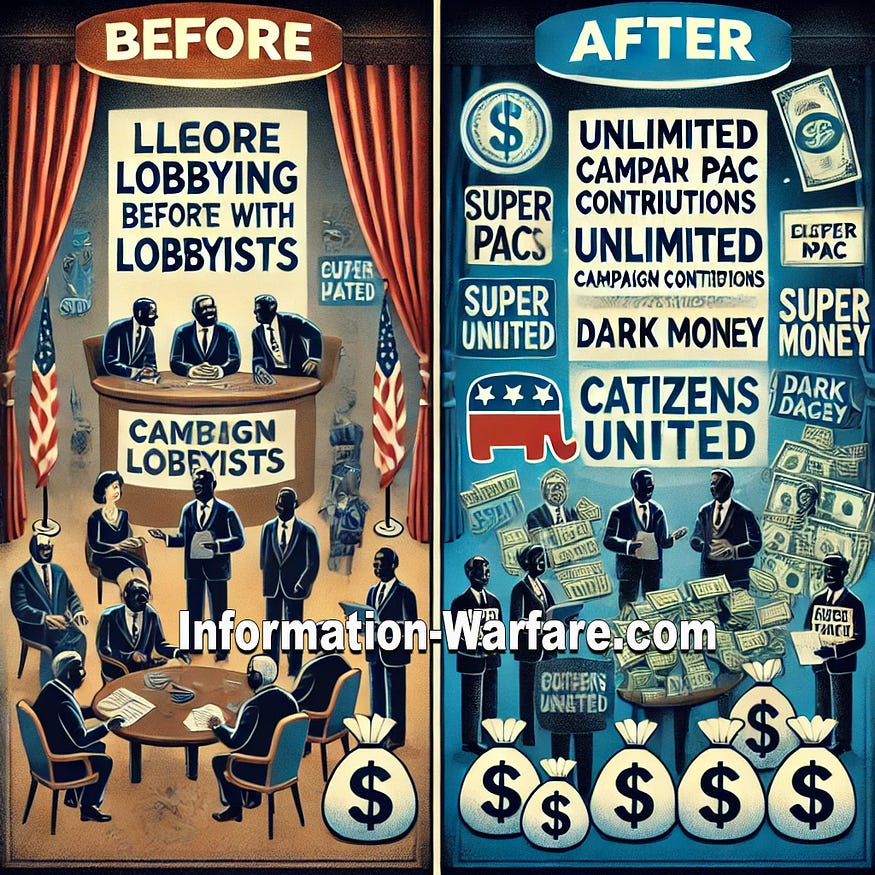How Lobbying Transformed: The Impact of Citizens United on American Politics
From Regulated Contributions to Unlimited Spending: A Deep Dive into the Evolution of Political Influence Post-Citizens United Ruling
Citizens United v. Federal Election Commission
Citizens United v. Federal Election Commission (FEC) is a landmark U.S. Supreme Court case decided on January 21, 2010. The ruling significantly altered the landscape of campaign finance by allowing unlimited political spending by corporations and unions. Here are the key aspects of the case and its impact:

Background of the Case
Citizens United, a conservative nonprofit organization, produced a documentary critical of Hillary Clinton during her 2008 presidential primary campaign. The Federal Election Commission (FEC) prevented Citizens United from airing the documentary, citing provisions of the Bipartisan Campaign Reform Act (BCRA) of 2002, also known as the McCain-Feingold Act. This act prohibited corporations and unions from funding “electioneering communications” within 30 days of a primary or 60 days of a general election.
Supreme Court Ruling
The Supreme Court’s decision in Citizens United v. FEC was delivered on January 21, 2010, with a 5–4 majority.
The Court ruled that:
1. Corporate and Union Spending: The government cannot limit independent expenditures for political communications by corporations, associations, or labor unions. The Court argued that such restrictions violate the First Amendment’s guarantee of free speech.
2. Political Speech: The decision emphasized that political speech is indispensable to a democracy, which is no less true because the speech comes from a corporation.
Impact of the Ruling
1. Super PACs: The ruling led to the creation of Super PACs (independent expenditure-only committees), which can raise and spend unlimited amounts of money to advocate for or against political candidates, as long as they do not coordinate directly with the candidates or their campaigns.
2. Dark Money: The decision increased the influence of “dark money” in politics. Nonprofit organizations can receive unlimited donations without disclosing their donors, which they can then use for political advocacy.
3. Political Spending: The ruling resulted in a surge in political spending by outside groups. For example, outside spending in federal elections increased dramatically from $143 million in 2008 to over $1 billion in 2012.
Criticism and Support
Supporters argue that the decision upholds free speech and allows for more voices in the political process. They believe it levels the playing field by allowing corporations and unions to express their views without government restriction.
Critics contend that it gives disproportionate power to wealthy individuals and corporations, undermining the democratic process. They argue that it leads to political corruption and diminishes the influence of ordinary voters.
Further Reading
- [Oyez: Citizens United v. Federal Election Commission](https://www.oyez.org/cases/2008/08-205)
- [Federal Election Commission: Citizens United Decision](https://www.fec.gov/updates/citizens-united-v-fec/)
- [Center for Responsive Politics: Dark Money Basics](https://www.opensecrets.org/dark-money/basics)
- [Move to Amend: Ending Corporate Rule](
https://movetoamend.org/
)
Lobbying Before Citizens United
1. Regulated Contributions and Spending:
— Federal Election Campaign Act (FECA) of 1971: This act regulated political campaign spending and fundraising, requiring full reporting of campaign contributions and expenditures and setting limits on contributions from individuals and political committees.
— Bipartisan Campaign Reform Act (BCRA) of 2002 (McCain-Feingold Act): This act further restricted campaign financing by banning unrestricted (“soft money”) donations to political parties and limiting the use of corporate and union money for ads mentioning a federal candidate within certain timeframes before elections.
2. Direct Lobbying:
— Personal Interactions: Lobbying primarily involved direct interactions between lobbyists and politicians. This included meetings, phone calls, and written communications to influence legislation and policy.
— Political Action Committees (PACs): PACs could contribute limited amounts of money directly to candidates and political parties. They raised funds from members and donated to campaigns within regulated limits.
3. Grassroots Lobbying:
— Mobilizing Public Opinion: Lobbyists often worked to mobilize public opinion to influence policymakers indirectly. This involved organizing constituents to contact their representatives, running public campaigns, and utilizing media to shape public discourse.
Lobbying After Citizens United
1- Unlimited Contributions and Spending:
— Super PACs: Citizens United led to the creation of Super PACs, which can raise and spend unlimited amounts of money to advocate for or against political candidates, provided they do not coordinate directly with the campaigns.
— Dark Money: The decision also increased the influence of “dark money” in politics. Nonprofit organizations can receive unlimited donations without disclosing their donors, which they can then spend on political advocacy.
2. Increased Influence of Corporations and Wealthy Individuals:
— Corporate and Union Spending: Corporations and unions can now spend unlimited amounts on independent political expenditures, leading to a significant increase in their influence over elections and policymaking.
— Wealthy Donors: The ruling has allowed wealthy individuals to contribute large sums to Super PACs, further amplifying their political influence.
3. Indirect Lobbying and Advertising:
— Political Advertising: Super PACs and other organizations can fund extensive advertising campaigns to influence public opinion and elections. These ads often target specific candidates and issues, shaping the political landscape.
— Issue Advocacy: Organizations can engage in issue advocacy, spending unlimited amounts to promote specific policy positions without explicitly endorsing or opposing candidates.
Examples and Comparisons
Before Citizens United:
Limits on Contributions: PACs could contribute up to $5,000 per candidate per election and $15,000 annually to any national party committee.
Regulated Ads: Corporations and unions were restricted in their ability to fund ads mentioning candidates close to elections.
After Citizens United:
Super PACs: Entities like Super PACs can now raise and spend unlimited funds. For example, in the 2012 election, Super PACs spent over $600 million, a dramatic increase from previous cycles.
Dark Money: Groups like 501(c)(4) organizations can spend heavily on politics without disclosing donors. In 2012, dark money spending exceeded $300 million.
Conclusion
The Citizens United ruling fundamentally transformed lobbying and political spending in the U.S. by allowing unlimited contributions and expenditures from corporations, unions, and individuals. This has increased the influence of wealthy donors and organizations, leading to more significant political polarization and concerns about transparency and accountability in the political process.

